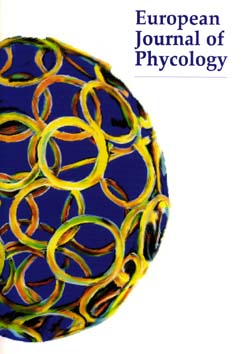Crossref Citations
This article has been cited by the following publications. This list is generated based on data provided by
Crossref.
CLAY, BREC L.
KUGRENS, PAUL
and
LEE, ROBERT E.
1999.
A revised classification of Cryptophyta.
Botanical Journal of the Linnean Society,
Vol. 131,
Issue. 2,
p.
131.
Preisig, Hans R.
1999.
Progress in Botany.
Vol. 60,
Issue. ,
p.
369.
Deane, James A.
Strachan, Isabelle M.
Saunders, Gary W.
Hill, David R. A.
and
McFadden, Geoffrey I.
2002.
CRYPTOMONAD EVOLUTION: NUCLEAR 18S rDNA PHYLOGENY VERSUS CELL MORPHOLOGY AND PIGMENTATION1.
Journal of Phycology,
Vol. 38,
Issue. 6,
p.
1236.
Kugrens, Paul
and
Clay, Brec L.
2003.
Freshwater Algae of North America.
p.
715.
Hoef-Emden, Kerstin
and
Melkonian, Michael
2003.
Revision of the Genus Cryptomonas (Cryptophyceae): a Combination of Molecular Phylogeny and Morphology Provides Insights into a Long-Hidden Dimorphism.
Protist,
Vol. 154,
Issue. 3-4,
p.
371.
Keeling, Patrick J.
2004.
Diversity and evolutionary history of plastids and their hosts.
American Journal of Botany,
Vol. 91,
Issue. 10,
p.
1481.
Hulvey, Jonathan P.
Padgett, David E.
and
Bailey, J. Craig
2007.
Species boundaries withinSaprolegnia(Saprolegniales, Oomycota) based on morphological and DNA sequence data.
Mycologia,
Vol. 99,
Issue. 3,
p.
421.
Breglia, Susana A
Yubuki, Naoji
Hoppenrath, Mona
and
Leander, Brian S
2010.
Ultrastructure and molecular phylogenetic position of a novel euglenozoan with extrusive episymbiotic bacteria: Bihospites bacati n. gen. et sp. (Symbiontida).
BMC Microbiology,
Vol. 10,
Issue. 1,
Gile, Gillian H.
James, Erick R.
Scheffrahn, Rudolf H.
Carpenter, Kevin J.
Harper, James T.
and
Keeling, Patrick J.
2011.
Molecular and morphological analysis of the family Calonymphidae with a description of Calonympha chia sp. nov., Snyderella kirbyi sp. nov., Snyderella swezyae sp. nov. and Snyderella yamini sp. nov..
International Journal of Systematic and Evolutionary Microbiology
,
Vol. 61,
Issue. 10,
p.
2547.
Laza‐Martínez, Aitor
2012.
URGORRI COMPLANATUSGEN. ET SP. NOV. (CRYPTOPHYCEAE), A RED‐TIDE‐FORMING SPECIES IN BRACKISH WATERS1.
Journal of Phycology,
Vol. 48,
Issue. 2,
p.
423.
Gile, Gillian H.
and
Slamovits, Claudio H.
2012.
Phylogenetic Position of Lophomonas striata Bütschli (Parabasalia) from the Hindgut of the Cockroach Periplaneta americana.
Protist,
Vol. 163,
Issue. 2,
p.
274.
Clay, Brec L.
2015.
Freshwater Algae of North America.
p.
809.
Nam, Seung Won
and
Shin, Woongghi
2016.
Ultrastructure of the flagellar apparatus in cryptomorphic Cryptomonas curvata (Cryptophyceae) with an emphasis on taxonomic and phylogenetic implications.
ALGAE,
Vol. 31,
Issue. 2,
p.
117.
Hoef-Emden, Kerstin
and
Archibald, John M.
2016.
Handbook of the Protists.
p.
1.
Jasso-Selles, Daniel E.
De Martini, Francesca
Freeman, Katalina D.
Garcia, Mikaela D.
Merrell, Trevor L.
Scheffrahn, Rudolf H.
and
Gile, Gillian H.
2017.
The parabasalid symbiont community of Heterotermes aureus: Molecular and morphological characterization of four new species and reestablishment of the genus Cononympha.
European Journal of Protistology,
Vol. 61,
Issue. ,
p.
48.
Hoef-Emden, Kerstin
and
Archibald, John M.
2017.
Handbook of the Protists.
p.
851.
Taerum, Stephen J
De Martini, Francesca
Liebig, Jürgen
and
Gile, Gillian H
2018.
Incomplete Co-cladogenesis Between Zootermopsis Termites and Their Associated Protists.
Environmental Entomology,
Vol. 47,
Issue. 1,
p.
184.
Taerum, Stephen J.
Jasso‐Selles, Daniel E.
Wilson, Megan
Ware, Jessica L.
Sillam‐Dussès, David
Šobotník, Jan
and
Gile, Gillian H.
2019.
Molecular Identity of Holomastigotes (Spirotrichonymphea, Parabasalia) with Descriptions of Holomastigotes flavipes n. sp. and Holomastigotes tibialis n. sp..
Journal of Eukaryotic Microbiology,
Vol. 66,
Issue. 6,
p.
882.
Tikhonenkov, Denis V.
Jhin, Soo Hwan
Eglit, Yana
Miller, Kai
Plotnikov, Andrey
Simpson, Alastair G. B.
Park, Jong Soo
and
Amato, Alberto
2019.
Ecological and evolutionary patterns in the enigmatic protist genus Percolomonas (Heterolobosea; Discoba) from diverse habitats.
PLOS ONE,
Vol. 14,
Issue. 8,
p.
e0216188.
Zlatogursky, Vasily V.
Shɨshkin, Yegor
Drachko, Daria
and
Burki, Fabien
2021.
The long‐time orphan protist Meringosphaeramediterranea Lohmann, 1902 [1903] is a centrohelid heliozoan.
Journal of Eukaryotic Microbiology,
Vol. 68,
Issue. 5,


